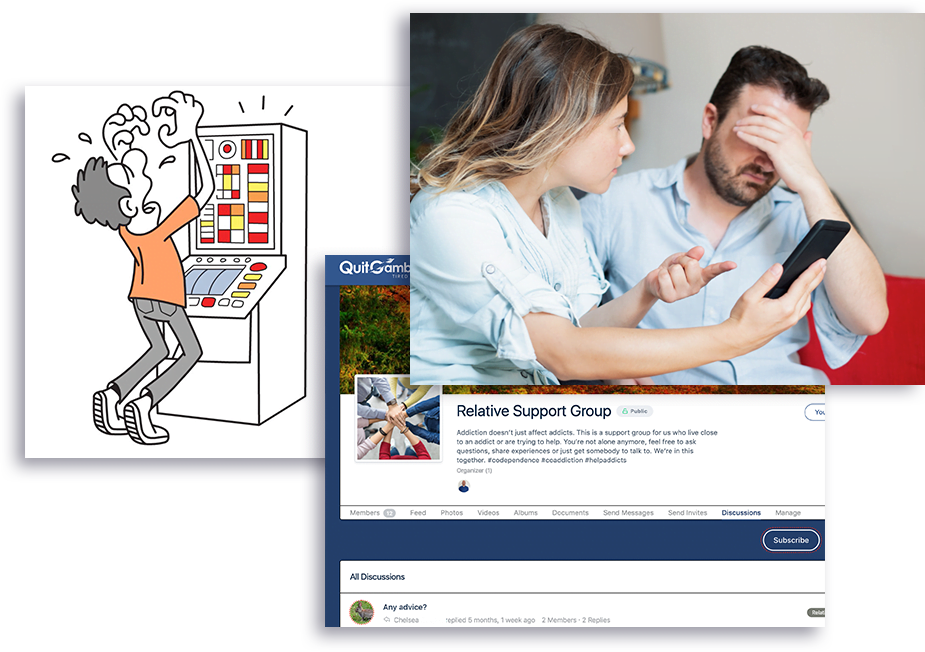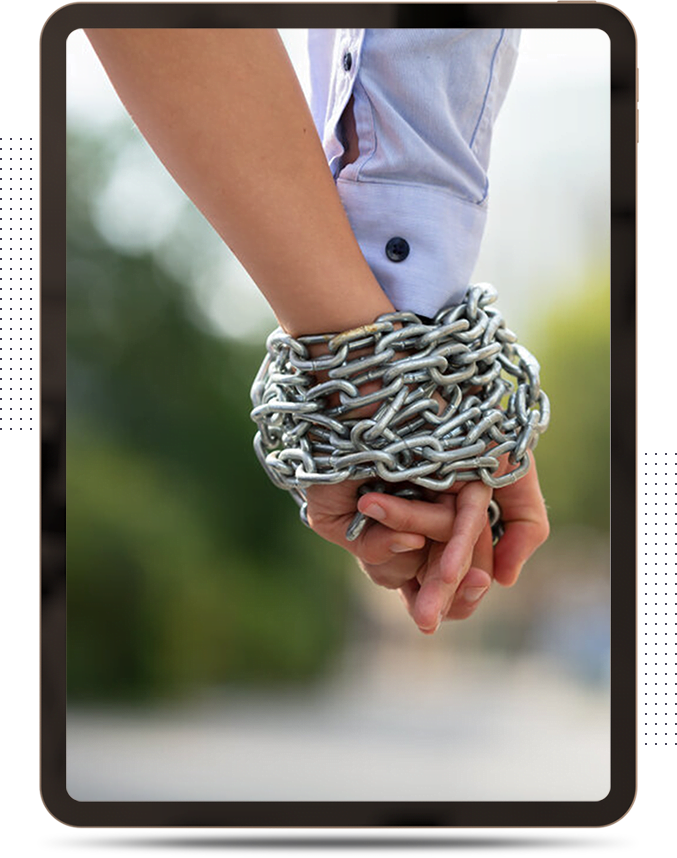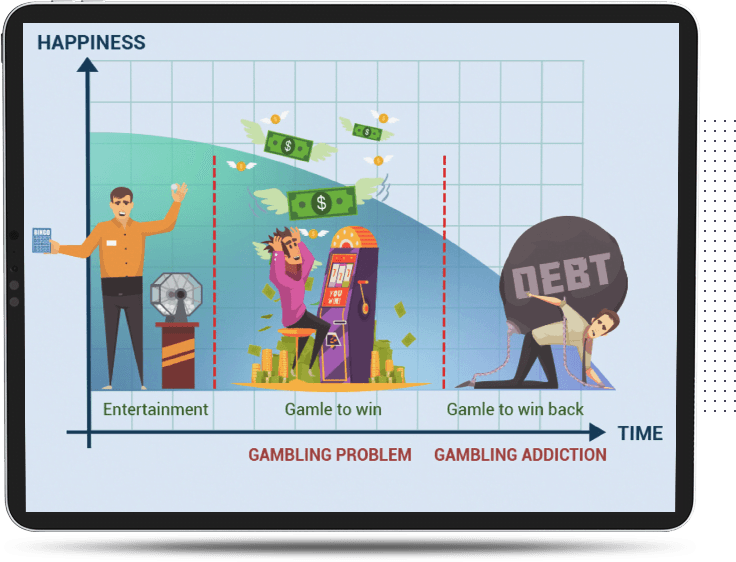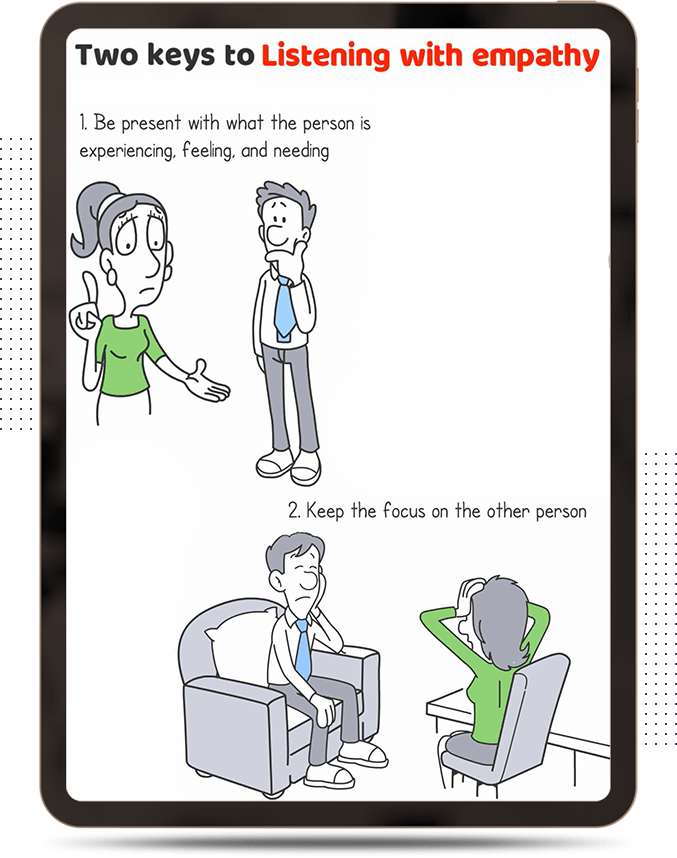How to help a gambler in the family
The How to Help a Gambler in the Family guide and video course provide the best tools we know for helping gambling addicts.the best tools we know for helping gambling addicts.
- Get our Video Course
- How to avoid co-dependency
- Let Nonviolent Communication help you.
How to help a gambler – Introduction
Can you recall the safety briefing on airplanes before take-off? They always tell you to put the oxygen mask over your own face before you can help anybody else; it’s the same with helping a compulsive gambler. You need to focus on yourself first.
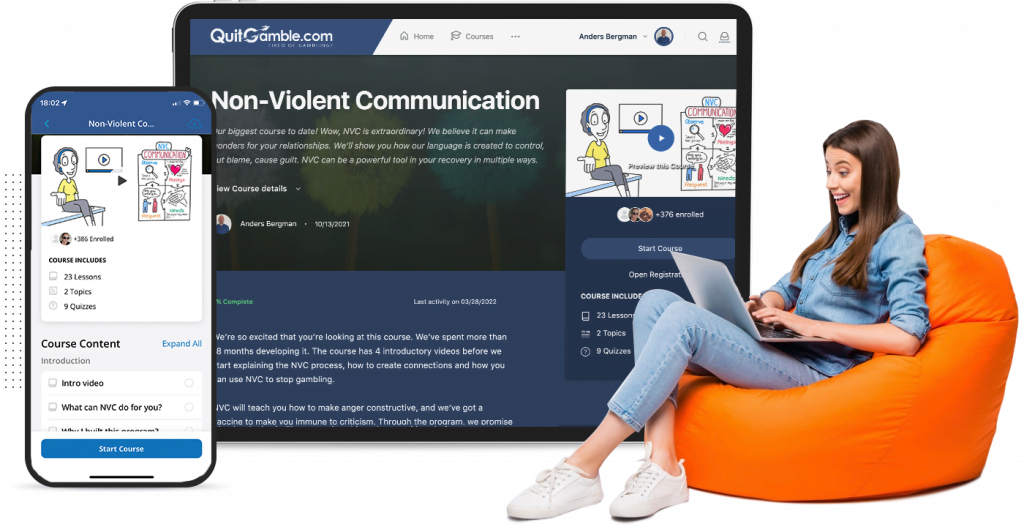
We admire you for your efforts, and we want to help you! We’ve developed a video course in nonviolent communication, NVC.
Here is how NVC can help you!
- The best tool to avoid co-dependence
- Help you forgive yourself and understand your feelings.
- Improve your communication
- Make it easier to approach and listen to the addict
The first step to help A Gambler in the family
Nonviolent Communication is a potent tool for every aspect of life. We highly recommend you take a closer look at it. The course is free when you sign up as a member.
This guide will show you the “invisible signs” of gambling addiction. We’ll discuss the dangers of co-addiction (co-dependence) and give you some valuable tools to protect you and improve your chances of helping a compulsive gambler.
Before we begin, know that most addicts want to be discovered! Don’t get us wrong; they are mortified, but the moment the bomb drops, when all lies are exposed, and they can finally come clean, it is often described as relieving.
Here are a few quotes about “coming out” from former gambling addicts:
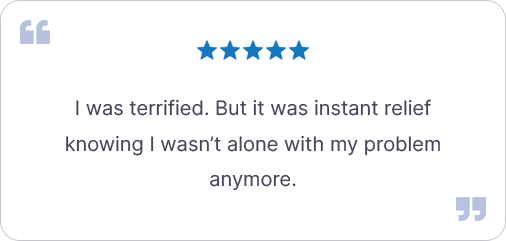
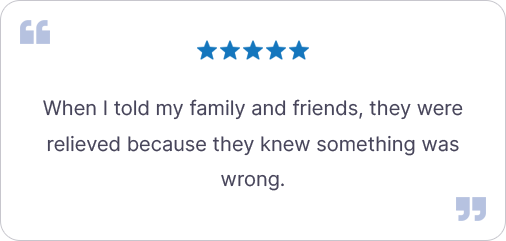
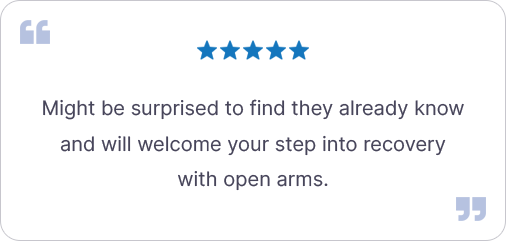
What Is Gambling Addiction?
At QuitGamble.com, we believe pain is the cause of addiction. We use ‘pain‘ as a collective for all the feelings and experiences we don’t want to have, like loneliness, boredom, stress, anxiety, lack of self-belief, etc. Drugs, alcohol, and gambling can be ways to escape the pain. It’s the escape that is addictive.
We believe there is an upside to addiction. Perhaps you have experienced the relief alcohol can give. For gamblers, gambling can have a similar effect. (Perhaps that explains why it’s so hard to quit gambling.) Addiction is the brain’s defense mechanism against pain. For a compulsive gambler, that defense is gambling.
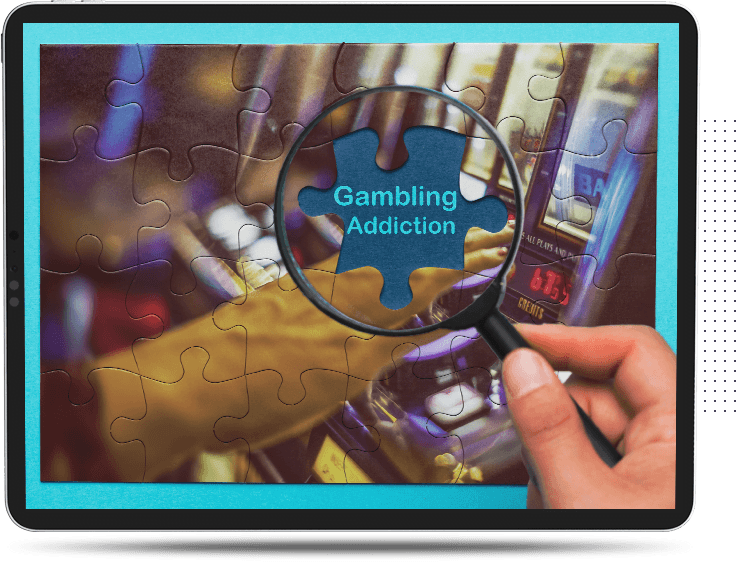
Our definition of gambling addiction:
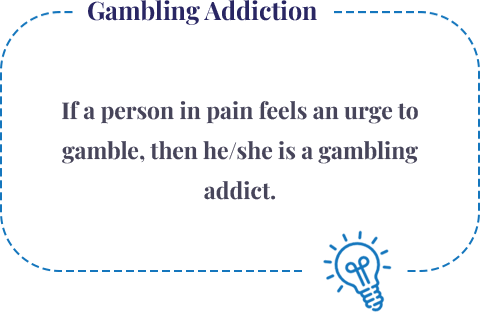
Remember the definition of gambling addiction when you read about all the shitty things addicts can do to “feed” their addiction. A compulsive gambler is not bad; they just do their best to escape their pain.
20-30% of people who gamble weekly show signs of problematic gambling behavior [1]. At the same time, 2-3% suffer from gambling addiction [2]. As a close affected, you might hear arguments about responsible gambling. (Both casinos and gambling authorities use the term A LOT) But, as one of our members said: “For a gambling addict, there is nothing like responsible gambling.” If you want to read more about responsible gambling, see this article.
As a relative, it’s essential to understand the difference between gambling problems and gambling addiction since you meet different challenges when trying to help them.
- Gambling Problem: The negative consequence of gambling isn’t overshadowing the fun parts for a problem gambler. It means it’s easier to handle a gambling problem, BUT, unfortunately, the person might not see gambling as a problem – yet…
- Gambling Addiction: A compulsive gambler often knows they have a problem, making it easier to admit. But, the addiction is so strong that it’s difficult to break free.
As you can see, each case poses different challenges. We recommend you read the article about addiction, discussing why a person gambles and the risk of developing a problem.
The article’s essence is that we believe a person is on thin ice as soon as the prime motivation of gambling is to win money.
Signs of Gambling Addiction in Family member
We’ll not make any difference between gambling addiction and gambling problems. The signs are very similar for you as a relative or affected other. However, the symptoms of gambling addiction may be easier to spot since the problems are worse for a compulsive gambler.
Compared to alcohol problems, it’s harder to discover gambling problems in a family member. Alcohol smells, and the person gets intoxicated. A compulsive gambler doesn’t smell and isn’t acting drunk.
But does it mean the signs of gambling addiction are invisible? No, it doesn’t. Here are the most common signs :
- You feel something is wrong, and the person seems troubled and worried. When you ask about it, you only get evasive answers.
- Changes in behavior make the person develop mood swings and quickly get upset or restless.
- The person hides something and spends a lot of time alone.
- Sleeping problems where the person sleeps poorly. It’s a common symptom of inner anxiety and excessive stress.
- Spends plenty of time gambling; you notice physically that the person is gambling a lot.
- Isolates themselves from social activities. Avoids family gatherings, after-works, and meeting friends.
- Problems completing things on time as the person will often postpone things. Spending too much time gambling makes it hard to manage work and social duties.
- Money: they might need to borrow money, get reminders for unpaid bills, and has problems with debt.
- The person used to talk about gambling but has suddenly stopped.
Find our full list of 54 signs of gambling addiction here.
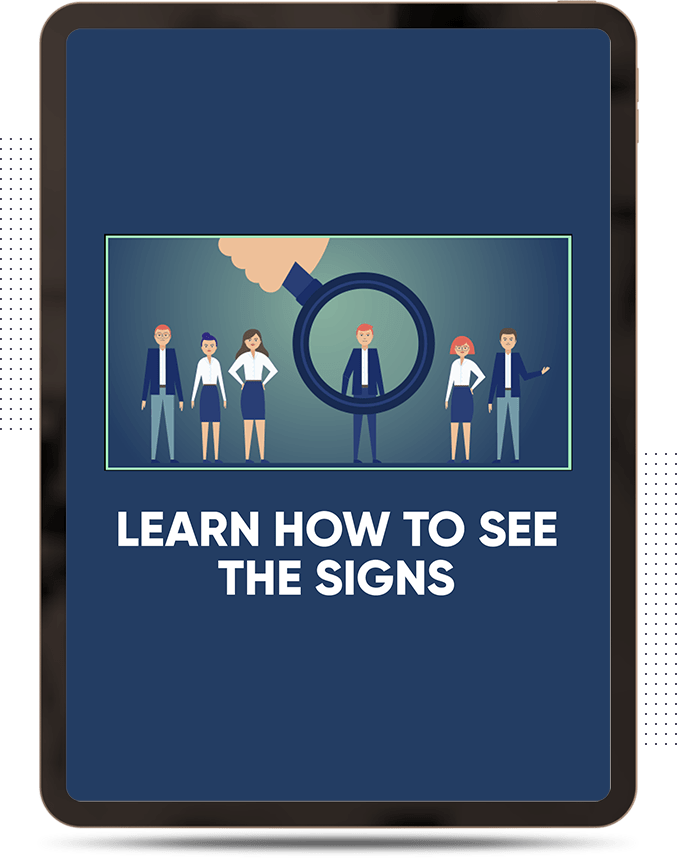
Not much to go on, we must admit. A depressed person or someone “having an affair” may show similar signs. Perhaps, you’ll see some of the signs above, maybe not. In any case, DON’T BLAME YOURSELF if you don’t notice anything. Most addicts are experts at hiding their problems!
One thing you can do is write things down. When you note down what happens at home, you get a chance to see patterns. Why do you get the feeling that something is wrong? How often does their mood change? How often do they isolate themselves? How…? You get the idea.
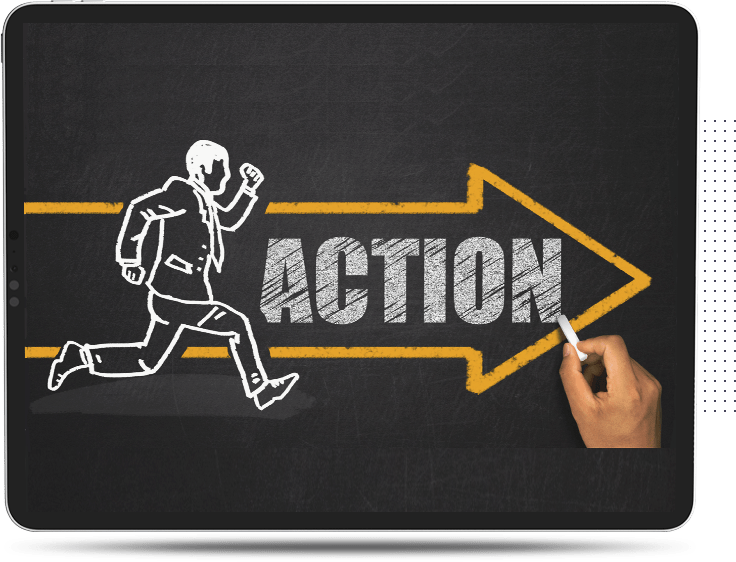
6 Ways How to Help a Gambler:
- Again, write down things happening around the person.
- Become a member of the QuitGamble.com Community. Chat, share your concerns, get advice, and discuss with problem gamblers and their relatives.
- Confide in someone else close to the person with gambling problems. It could be a family member, partner, close friend, or colleague. You don’t have all the information. Find someone that can help you, help the gambling addict.
- Study gambling. Read about online gambling to get a basic understanding of online casinos, poker, and sports betting. It will help you at a later stage.
- Be extra attentive to anything concerning money; invoices, reminders, loans, etc.
- Care for yourself! Avoid falling into the co-dependency trap. (More about that later.)
You’re not spying! You’re not going behind someone’s back! You’re not betraying anyone!
REMEMBER, the person wants to be exposed!
It’s crucial to talk with another relative. You get some support, and you can gather more information together. That way, you’re not alone.
For a co-worker, it’s hard to observe the behavior at home. Likewise, it’s difficult for a spouse to see how they behave at work. If you worry the person has taken loans, ask family members or close friends of the gambling addict if they borrowed money from them.
- Check your bank accounts if you have joint accounts with the person (or ask someone who has).
- Check the person’s credit records/score. There are services for that online.
- Check the mail for past-due invoices and debt collection letters.
- Look for gambling apps on the person’s computer and mobile. (Be extra attentive.) The image on the right shows 24 popular casino apps.
If you look for signs and actively take action to understand what is going on, you have already made great progress. Before you talk with the person, we want to focus on you!
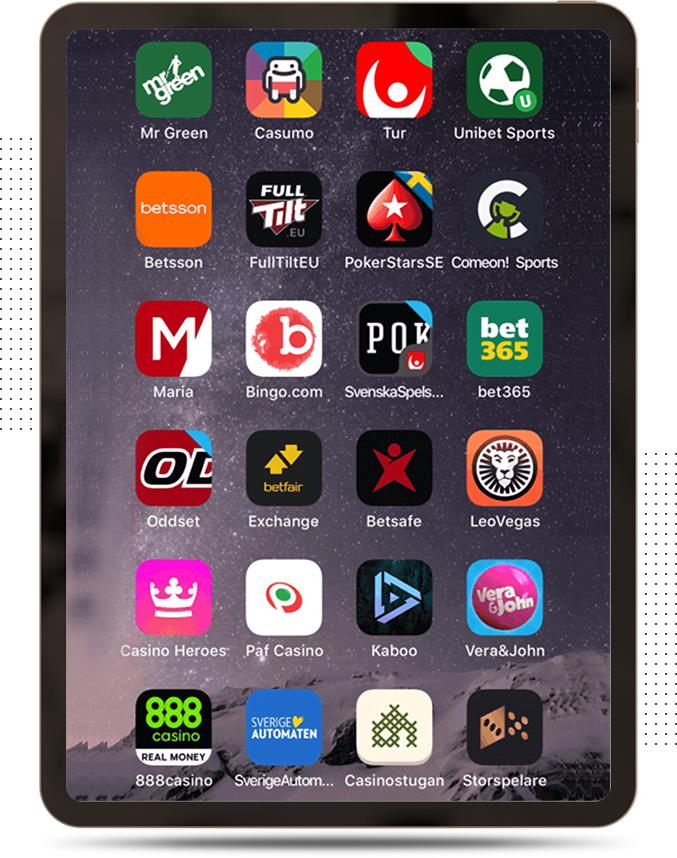
What Is Co-Dependence?
Co-dependence, also called co-addiction, is a severe condition that can occur in people around an addict.
Definition of Co-Dependence
Co-dependence or Co-addiction can occur to a person who lives close to an addict. Since the the person doesn’t know how to handle the addiction, he/she starts adapting to it, rather than counteract it.
After discovering that someone has lied about gambling problems (and what they’ve done), the first thoughts may be feelings of anger, disappointment, betrayal, and grief. Even so, it’s about a person close to you, someone you potentially love. In such situations, people often let their positive feelings for the person take over. Consequently, they risk falling into a co-dependency. Instead of counteracting the addiction, they start to adapt.
What are the signs of co-dependence? [3]
- Cover up financially. For instance, pay debts and invoices to protect the person with a gambling problem. It’s also common to lend them money.
- Defending their behaviour to others.
- Feeling responsible for the addict’s behavior.
- More comfortable to give.
- Unhealthy boundaries; the co-dependent person can’t set personal limits and let the addict push them around.
- Put the needs of the addict ahead of their own needs.
- Easily over-engage themselves and become attracted to people who need special attention or something of that nature.
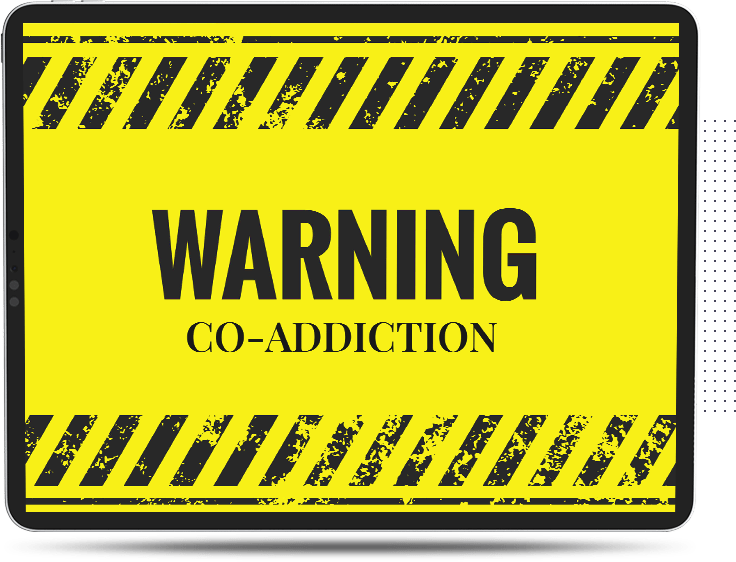
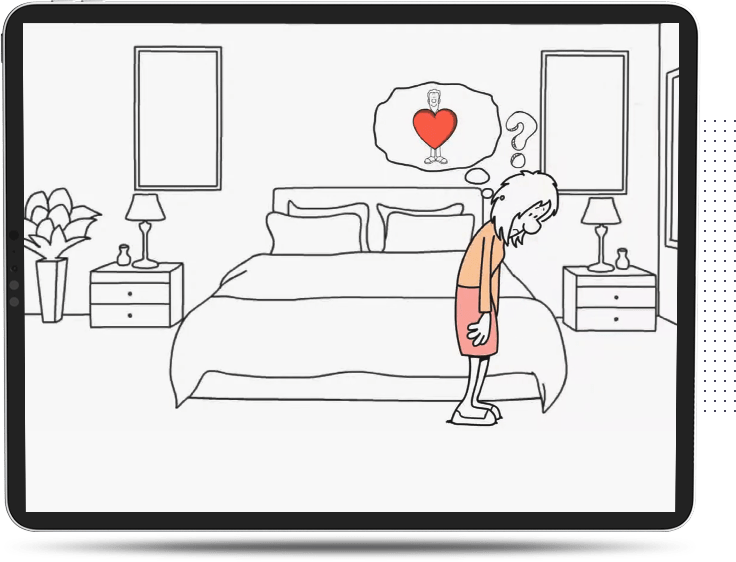
Spontaneously, it sounds like a co-addicted person is a wonderful human being. The problem is that co-dependency creates a destructive pattern in their life. It isn’t their life anymore! Typical symptoms of co-dependence are:
- Depression
- Fatigue
- Low energy
- Low self-esteem
- A feeling of living someone else’s life
Before we continue, we’d like to share another NVC video with you. We tend to take responsibility for other people’s feelings. It’s bad under normal circumstances but can be catastrophic when dealing with a gambling addict.
7 ways to avoid co-dependence
- Get help by becoming a member of the QuitGamble.com Community to get tips and advice from other people trying to help gambling addicts.
- Take our Nonviolent Communication course.
- Put yourself first! Remember the safety briefing before
take-off. You must place the oxygen mask over your
face before you can help anybody else! - Dare to act – be brave and do something about the
problem. Even if it feels hard, even hopeless, it doesn’t
have to be like this anymore. ACT NOW! - Decide on rules. Set limits and demands. Be tough, don’t use empty threats. You must be strict to be taken seriously.
- Never accept bad behavior. Set clear rules about what is acceptable and what is not. Set the bar high and make sure that it’s adhered to. If not, that bad behavior may become normalized.
- Read our guide on how you can protect yourself from a gambling partner.
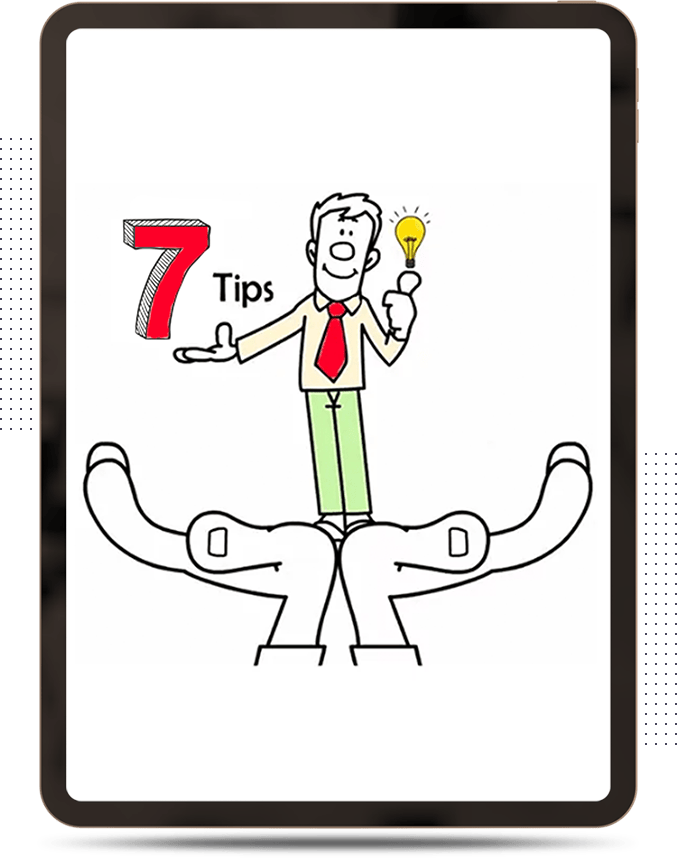
How To Confront A gambler in the family
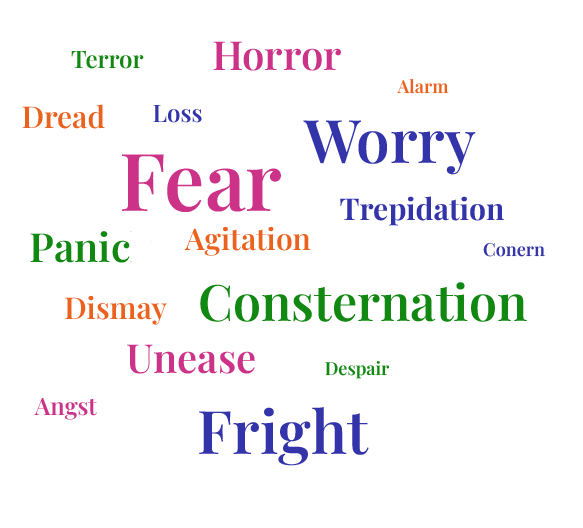
The natural reaction after discovering that someone close to you has lied, manipulated, and perhaps even stolen from you is to act out! HOW COULD YOU DO THIS? HOW COULD YOU BE SO STUPID…?
At QuitGamble.com, we believe pain is the cause of addiction. If you condemn, shame, guilt, or yell at somebody, it will create more pain. And then what happens? The person will feel a stronger urge to gamble.
What prevents you from talking with the person? What are you afraid might happen? Perhaps you’re worried about the person’s reaction or how you will or should respond. (Don’t fret; the NVC program also contains a lesson in fear.)
Here are some common fears:
- Fear of conflict
- Fear of anger
- Fear of disappointment
- Fear of getting hurt
- Fear of breaking up
- Fear of pain
- Fear of accusations
- Fear of retaliation
We are all afraid and insecure sometimes. It’s completely natural and a vital reason humans have survived through evolution. Our intention is not to scare you. We want to make you mentally strong and prepared for what can happen.
Did you ever read The Brothers Lionheart by Astrid Lindgren as a kid? If not, read it! There Is A Great Quote In There :

If Jonathan can do it, so can you and me! It’s not physically dangerous to talk with a person with gambling problems, but it can be excruciating. BUT WHAT IS THE ALTERNATIVE?
What Happens If The Person Continues Playing?
You risk becoming co-dependent. You may start to cover up for the person, and the price can be high financially and mentally. (Read the text about co-dependency again.) If you’re married to the person, you may even get into debt.
Gambling can ruin people’s lives with unmanageable debts, loans, lost friends, and estranged relatives. Gambling addiction is also the addiction with the most suicides[5]. BUT, we have good news:
You can make a difference!
Let’s Get You Prepared!
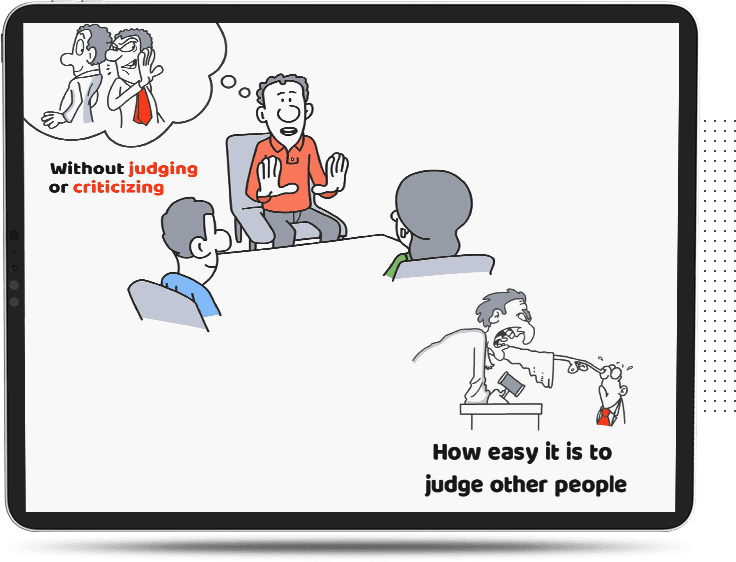
Nobody likes to admit flaws or problems. Consequently, problem gamblers often deny they have gambling issues. They blame anything and everything else or think the problem is exaggerated.
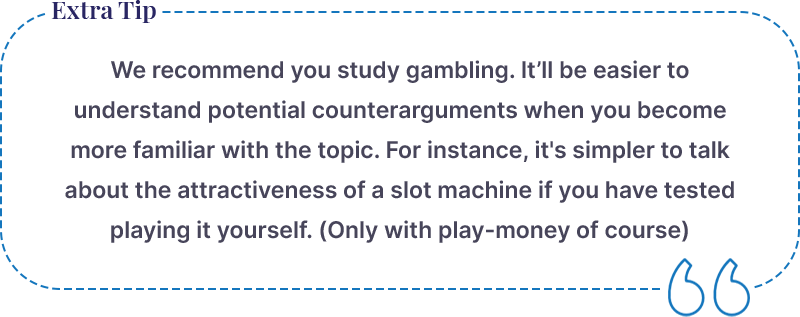
When we talk about our weaknesses, we get extra sensitive to criticism. The way around that is to pay extra attention to our communication, stick to facts, and avoid expressing opinions or analyses.
A good start is to read our article, “Can you win?” You also read the following article covering basic gambling terms:
- Online casino’ (Understand the following terms: casino bonus, free spins, slot machines, live casino, and jackpots.)
- Slot machines’ (Play for free in Play Mode without opening accounts.)
- Poker (The most popular game is Texas Hold’em.)
When somebody with gambling problems contacts us, we begin with the following questions: “What is gambling doing for you?” and “What happens when you gamble?” Notice how the questions are nonjudgmental. We show curiosity and a wish to understand why they do what they do.
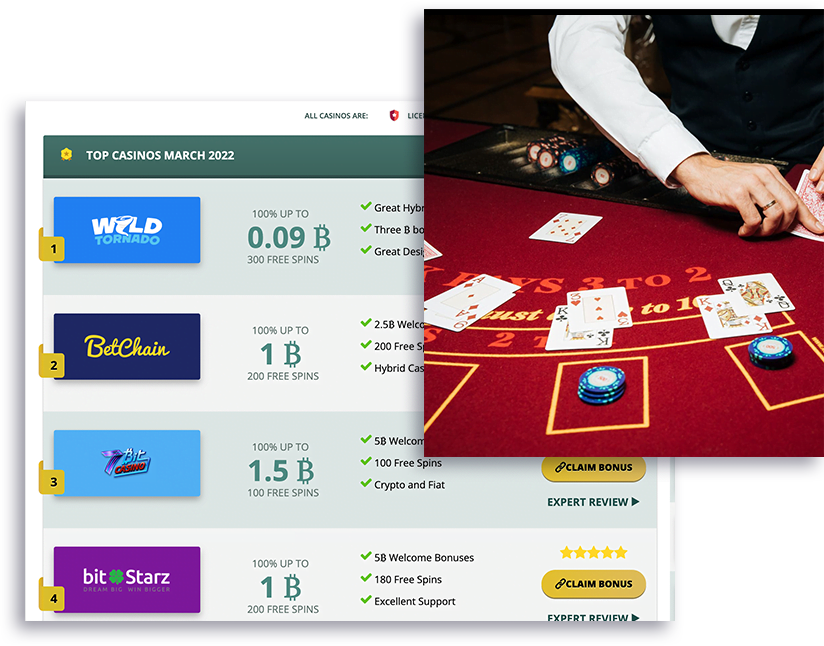
How to Get the Conversation Started
During this conversion, you have two tasks: firstly, encourage the person to talk. Secondly, be attentive and focus on their personal experiences, feelings, and needs. (Here is an article about the mistake of losing focus.) Use open-ended questions to get the conversation started. Remember, the person (on some level) wants to share; nobody feels good about lying to their family and friends. Listen and let them do the talking. [4]
We know it’s not easy, but giving someone your full attention and listening without judging or analyzing is a precious gift. When you do that (you’ll learn the techniques in the NVC course), that’s when you can create a real connection.
The way out of addiction begins with reconnecting. By making reality more meaningful, the escape becomes less attractive. The result? The urge to escape will decrease.
Gambling is not what the person is addicted to; the escape from reality is the actual addiction. Read the article, why do people gamble for more information.
Gambling is nothing but their preferred way to escape.

Good Questions for a Gambling Addict to Get the Conversation Started
- What is gambling doing for you?
- What happens when you gamble?
- Does it create a moment of peace? Is that perhaps why it’s so hard to quit?
- How does it feel to talk about it?
- When did you start gambling? How did you feel then?
- What was it that attracted you?
- How did it feel when you started losing control?
- Did anything particular happen around that time?
- Do you want to stop gambling?
- Do you want some support?
- Where do you want to go from here?
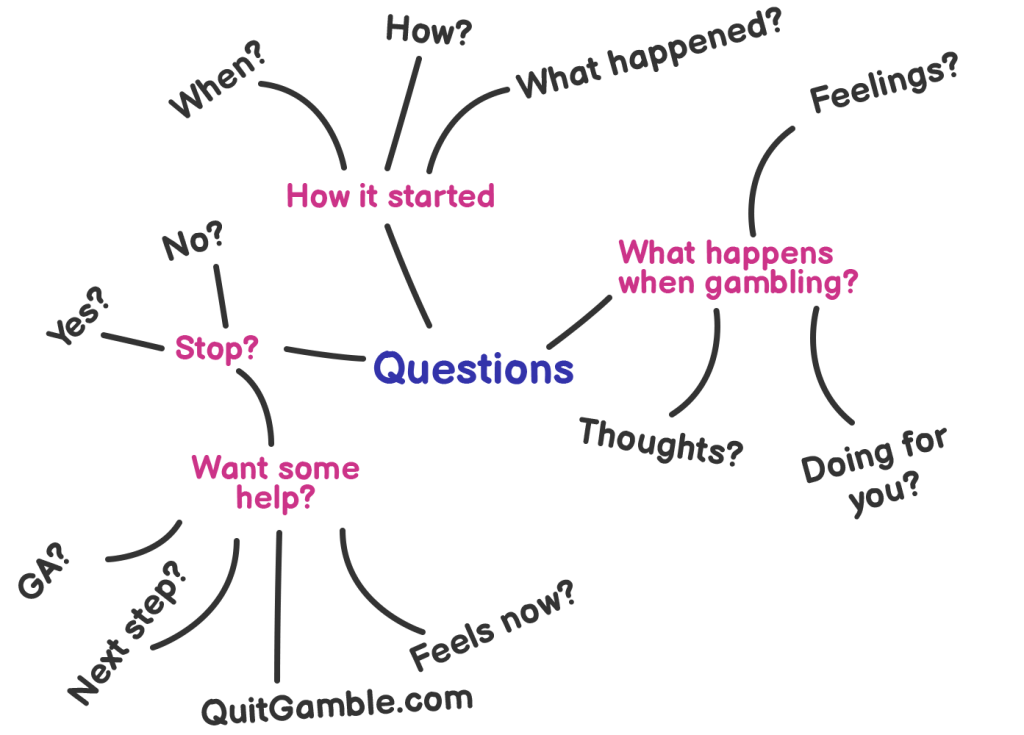
Action list – How to help a gambling addict
About 80% of people with gambling problems don’t seek help. They might be ashamed, not want to attend a meeting, or not want to admit any problems. One reason we developed QuitGamble.com is to change that. We tried to lower the threshold to take that first step.
QuitGamble.com is anonymous; a person doesn’t need to admit to problems or say they are helpless and can also start their journey home. Instead of condemning, shaming, or guilting, we want to empower, create meaning, and show them their importance.
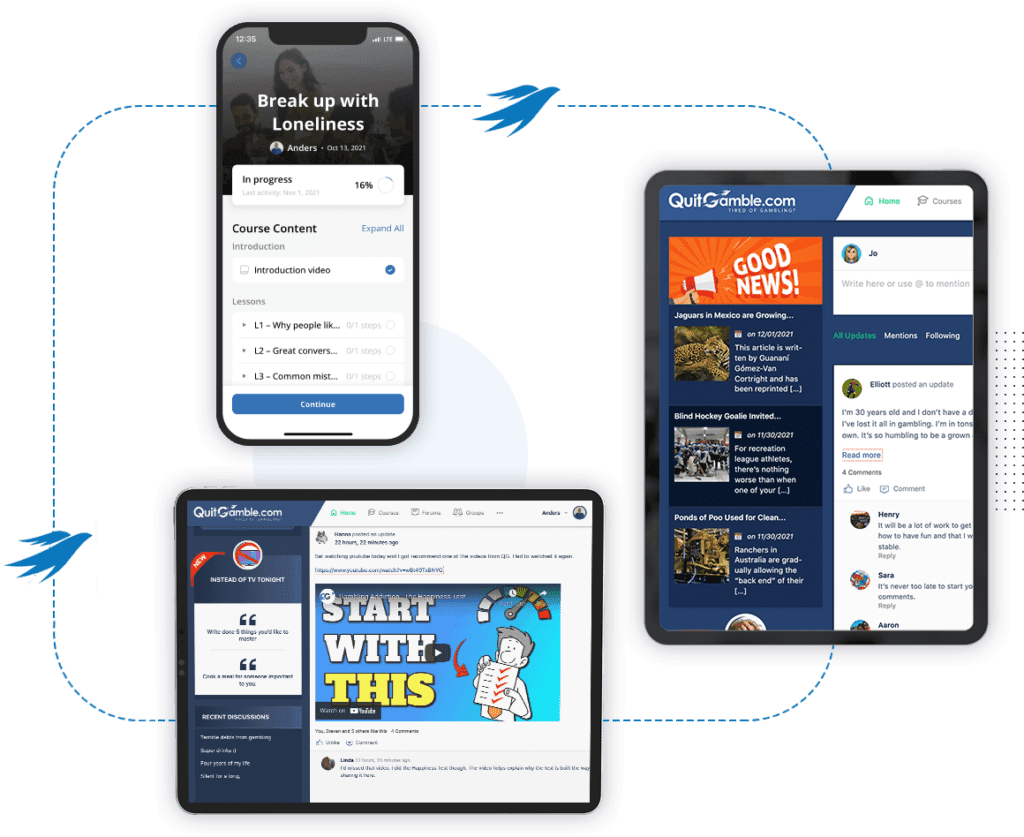
Unique self-help tools for you on how to help gambling addiction:
- Guides like these and fun animated videos you can share with your relatives.
- The Happiness Test helps identify the pain causing the urge to gamble. This test is the starting point for a plan to move forward.
- A social community of people who want to quit gambling and people who want to help a gambling addict. Chat, discuss, and share experiences 24/7.
- The Nonviolent Communication course. (And 14 other programs.)
You’re a hero. You’re not alone anymore. We want to be there for you as much as we can.
How To Help Someone With Gambling Problems – We have structured the action list in 4 parts.
Let’s take action, starting with you. We recommend the following for you:
Focus On Yourself First
- Read through this guide.
- Stick to your routines (go for walks, meet with friends, cook food, work out…). Decide on three things you’ll do only for yourself during the next three days.
- Read through the Guides about ‘Addiction,’ ‘Can you gamble and win?,’ and ‘The prevention Guide‘ That’ll give you a head start!
- Sign up as a free trial member on QuitGamble.com to take advantage of our resources.
- Ask the other members any questions you might have.
- Read stories from others affected by this in our Relative Support Group.
- Work through the Nonviolent Communication course. We can’t recommend it enough!
- Read the section about co-dependency again – list six things you’ll do to avoid becoming co-dependent.
- Spend a few hours reading about online casinos, sports betting, and poker. It will give you a better understanding of the topic.
Focus On The Problem Gambler
- Pay attention to the person.
- Is there anything wrong?
- What warning signs can you identify?
- Monitor the behavior. Any changes? Be attentive and write things down.
- Focus extra attention on things that regard money.
- Ask questions about how the person is feeling.
- Try to come up with ideas of things you can do together. That will distract both of you and allow you to spend time together.
- Ask another relative for help — perhaps a partner, close friend, family member, or co-worker. Share your concerns and ask them to be observant of various warning signs. We recommend that they read through this guide as well.
Have “The” Talk!
- Sit down with the person. Tell them about your observations, feelings, and needs. Then, ask them to tell you about what you’ve observed. If you need extra support, ask another relative to join the conversation.
- Talk through everything from the beginning; use open-ended questions to get the conversation going. Avoid judging or analyzing, focus on the person’s feelings, and start building a connection.
Plan for the Future
- (You) You mustn’t lend the person money. If you help them financially, the person will not take responsibility for their actions. You’re only doing them a disservice.
- (Together) If they gamble online, install an app like Gamban or Gamblock together. It’ll block all gambling sites.
- Check if there are any ways to self-exclude from casinos in your country.
- (Together) Encourage them to do the Happiness Test. After the test, sign up on QuitGamble.com together. You can create separate accounts to get the individual support you both need.
- (Together) If the person has a lot of gambling debt with high interest rates, help them find someone who can consolidate all loans into one bigger loan with a lower interest rate.
- (Together) Plan a few social activities together and be outside in nature. Help them reconnect to both nature and other people. For example, they take long walks or go to the gym together.
- (Together) Open up to other relatives together. They can also support you. We are strong alone is a myth – WE ARE TRULY MUCH STRONGER TOGETHER!
- (Together) In most countries, there are physical support groups for gambling addicts, such as Gambler’s Anonymous. The 12-step program at GA works for some people and could complement our QuitGamble.com work.
Everybody needs to find a way to recover from a gambling problem. We at QuitGamble.com don’t see GA or any other service that helps people with gambling problems as competitors. We’re all trying to answer the question of how to help someone with gambling addiction, and if another method works for your relative, WE COULDN’T BE HAPPIER!
We hope you’ve found this guide on how to help a gambling addict helpful. We look forward to getting to know you better in the QuitGamble.com Community. Don’t hesitate to sign up for a 7-day free trial membership.
If you liked this guide, please share it with anyone who might find it helpful!
Good luck!
Sources:
[1] In a survey conducted by the Swedish Gambling Authority in 2021, 27% of the participants answered that they had gambled in the past week. According to the Swedish Health Authorities, 4% of the population has gambling problems, is at increased risk for gambling problems, or is at risk of developing gambling problems. An educated guess is that you’d find this 4% among the 27% who gambled last week. It means about 15% of them have/show some kind of gambling problem. In a report from 2018, the UK Health Authorities estimate that 3.8% of the population has/shows signs of gambling problems.
[2] The exact number of gambling addicts varies in each study you find online. In the Swedish survey by the Swedish Gambling Authority, 2% gambled each day, and 2% responded they gambled too much in the past year. An educated guess is that these people suffer from some kind of gambling problem or gambling addiction.
[4] The book: Nonviolent Communication – A language of life by Marshal Rosenberg
